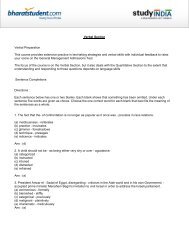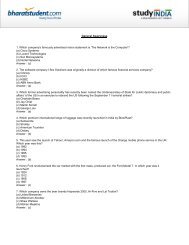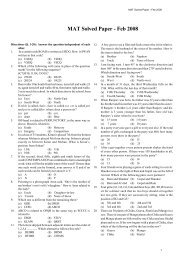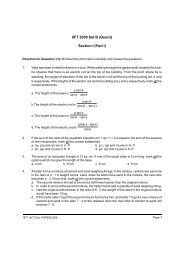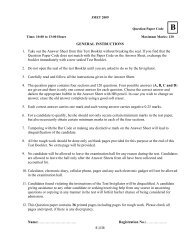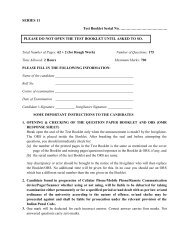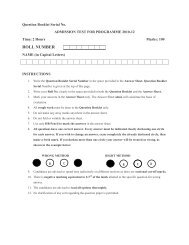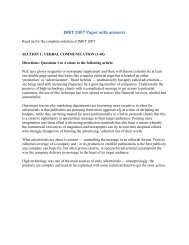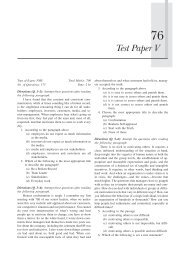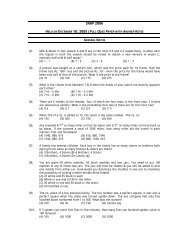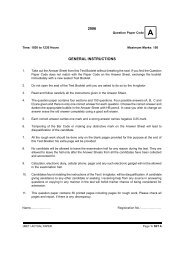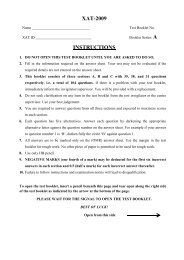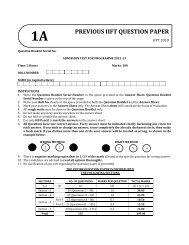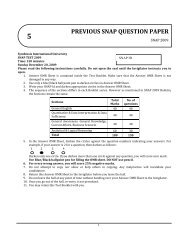PREVIOUS FMS QUESTION PAPER
PREVIOUS FMS QUESTION PAPER
PREVIOUS FMS QUESTION PAPER
You also want an ePaper? Increase the reach of your titles
YUMPU automatically turns print PDFs into web optimized ePapers that Google loves.
afford not to adapt or innovate. Indeed, they try to be<br />
aggressively adaptive and innovative, not merely<br />
technologically but also in various areas of<br />
management. Interestingly enough, the current levels<br />
of PI in organizations are more strongly influenced by<br />
strategic decisions taken in the past than the other way<br />
around. That is, the past Pl has an insignificant effect on<br />
present norms, decisions and managerial functions. For<br />
example, the past policy of recruiting creative<br />
managers at junior levels deliberate efforts to inject<br />
pioneering and innovative practices regarding business<br />
strategies (with reference to diversification,<br />
integration, marketing), operating modes (e.g.<br />
autonomy, accountability, cooperation), and personnel<br />
(e.g. reward and punishment, communication) were<br />
found to have significant effects on the current levels of<br />
Pl; but past PI did not influence any of it. Similarly, past<br />
norms regarding excellence, expertise, dedication and<br />
the lower levels of dependency facilitated current PI<br />
levels, but not the other way around. In sum, PI<br />
management is an outcome rather than a cause of<br />
managerial policies and practices. Furthermore, PI<br />
management is more effective in an environment which<br />
offers opportunities than one which is highly<br />
controlled.<br />
Once PI management becomes operative, it improves<br />
overall performance, the organisation’s growth, public<br />
image as well as adaptability to circumstances improve.<br />
It heightens the achievement and result orientation of<br />
top management and lowers authoritarian norms at<br />
middle management levels. In order to realise the<br />
organisation’s goals, the PI executives seek out a<br />
complex, turbulent but favourable environment. It is<br />
worth noting that past PI is negatively related to the<br />
maintenance of friendly relations with colleagues. PI<br />
‘perhaps temporarily lowers friendship ties at senior<br />
management levels.’ Relationship orientation,<br />
particularly primary relationship, is probably not part<br />
of the PI package. Relationship is an offshoot of the<br />
‘affiliative orientation’ which is a business typical of the<br />
traditional style of management. According to<br />
Khandwalla “a traditional top management, wedded to<br />
the status quo, may breed a clubby kind of affiliative,<br />
even somewhat task-oriented, work ethic at the next<br />
level of management, but a ‘politicised’, cliquish,<br />
conflict ridden, low work ethic, passivity prone culture<br />
PP-02 2A.11<br />
<strong>FMS</strong> Dec 2010<br />
at middle-junior management levels. Also, the tenure of<br />
senior managers tends to be long in conservative setups.<br />
This may breed a fairly strong, affiliative<br />
orientation among the old timers.” Khandwalla devised<br />
an essentially PI-like strategy for the turnaround<br />
management of sick enterprises.<br />
A few years later, Khandwalla added that it is the<br />
‘humane’ rather than the ‘surgical’ turnaround strategy<br />
which works in the developmental context. The<br />
turnaround and PI styles should be considered as a<br />
whole and integrated model in which the relative<br />
relevance of each depends on the health of the<br />
organisation. The sick ones need turnaround to be<br />
followed by PI management in order to make the<br />
organization even more vibrant and healthy. The<br />
underlying basic assumption in both of them is the<br />
centrality of the task system which must be built,<br />
restructured and managed rationally and scientifically.<br />
37. According to the passage, managers who adopt PI<br />
management style<br />
(1) Avoid risks<br />
(2) Adopt sophisticated technology<br />
(3) Do not adapt or innovate<br />
(4) None of the above<br />
38. Which of the following is NOT a correct statement?<br />
(1) Organisation’s growth is regulated by PI<br />
Management Style<br />
(2) Organisation’s image improves with PI<br />
Management Style<br />
(3) PI Management improves organisation’s<br />
adaptability<br />
(4) PI Management improves the result<br />
orientation of organisation<br />
39. According to the author of the passage,<br />
(1) Khandwalla is a proponent of the traditional<br />
style of management<br />
(2) Khandwalla is a critique of the traditional style<br />
of management<br />
(3) Khandwalla is neither a proponent nor a<br />
critique of the traditional style of management<br />
(4) None of the above



